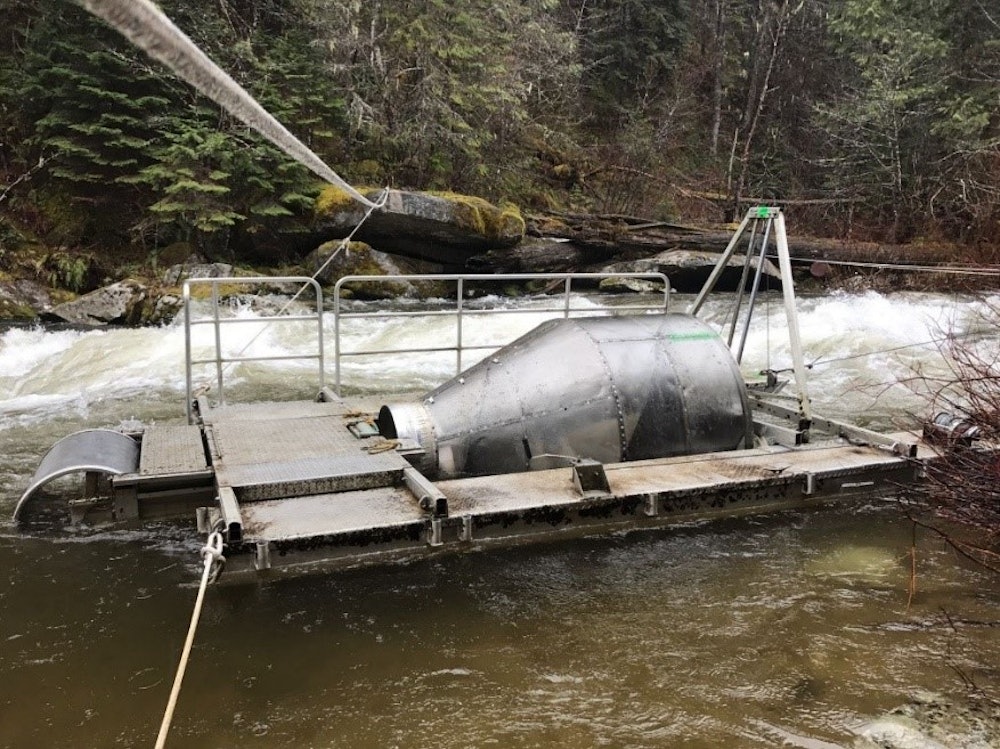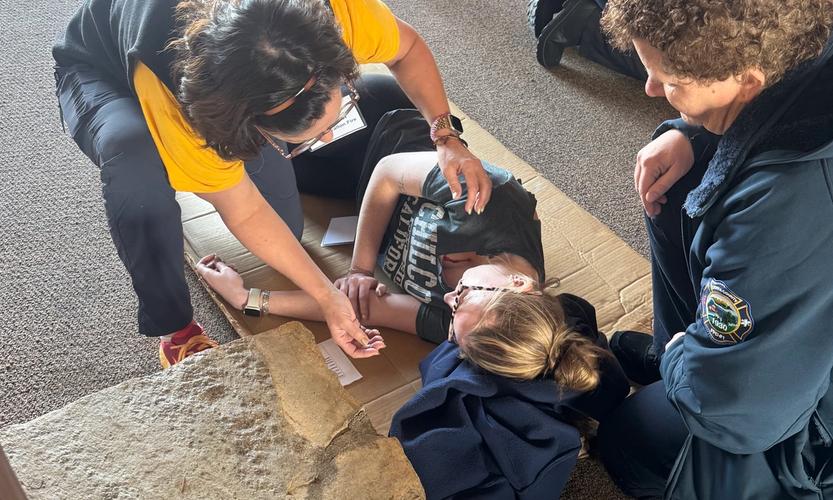Rotary Screw Traps Are Coming To The North Yuba!
August 10, 2023
Press Release by South Yuba River Citizens League Rotary Screw Traps (RSTs) are specially designed sampling devices that capture downstream migrating juvenile fish such as salmon and steelhead. They are large, cylindrical traps that float on pontoons. This October, two RSTs will be installed on the North
Yuba River, one at Rocky Rest Campground at RM 25.6 and the other along Old Toll Bridge Road at RM 33.4. They will be there from October 2023 to May 2024. Public outreach events regarding safety around these RSTs will be held at the end of August in both
Downieville and Nevada City. These RSTs will gather data on how traps of this type perform in the North Yuba for future efforts conducted by the Yuba Salmon Study. While they are important data-gathering devices, RSTs can be dangerous to you and your loved ones—including your pets. You can easily enter the mouth of the rotating cone, become injured by the rotating wings, and even get pinned underwater. With
two of these devices going into the North Yuba River, you must be aware of these dangers. Never swim or float near an RST and ensure your pets don’t go near them. Do not climb on an RST, as this is dangerous and could damage the RST. For more information
on safe passage around these RSTs on rafts and kayaks, please visit YubaSalmonStudy.com/where-will-the-rsts-be-located. The Yuba Salmon Study is a collaborative planning and implementation program led by the National Oceanic and Atmospheric Administration (NOAA), Fisheries, and the California Department of Fish & Wildlife (CDFW). The vision of this project is to reintroduce
spring-run Chinook salmon to their historical habitat in the upper Yuba River watershed through a phased, science-based, and cost-effective reintroduction project that will inform future Central Valley reintroduction decisions. The RSTs going into the North Yuba have three main components: a 5-foot or 8-foot diameter cone, a trap box, and pontoons. Inside the cone, wings are situated in a spiral shape so that, as stream currents push against them, the cone will rotate on its
horizontal axis, much like a windmill. As downstream-moving fish enter the mouth of the rotating cone, they are guided to a submerged trap box where the fish are held until they are sampled and then released. The pontoons provide floatation for the cone
and trap box assembly. Rocky Rest Campground is located close to Hwy 49 in Camptonville, CA, about 10 miles west of Downieville. At this site, the RST will be anchored to a cable elevated well above the water surface and suspended between two large trees upstream of the walking
bridge. The RST will be tethered to that cable using two “leader” cables. In this way, operators can adjust the trap upstream and downstream with discharge to maximize its trapping efficiency or readily move it out of the main current in the
event of high water. The RST off of Old Toll Bridge Road will be located approximately 0.5 miles upstream of the intersection of Mountain House Rd and Old Toll Bridge Road, upstream of the community of Goodyears Bar. At this site, the RST will be installed using one cable
running upstream, at water level, to a cluster of alders near a natural backwater feature. A second cable will be anchored directly to shore, keeping the RST close to the river-left bank. A single, lightweight cable will be run between two trees to suspend
an in-water hazard sign. The Downieville Public Outreach Meeting will be held on August 23rd from 4:30 to 6:30 at Sabrina’s at the Forks (308 Main St, Downieville, CA 95936). The Nevada City Public Outreach Meeting will be held on August 30th from 4:30-6:30 at the Gene
Albaugh Community Room at the Nevada County Library (980 Helling Way, Nevada City, CA 95959). Further information about these meetings, RSTs, and the Yuba Salmon Study can be found by visiting the Yuba Salmon Study website at YubaSalmonStudy.com.
Featured Articles

Sierra County Completes Mass Casualty Incident Training →
January 15, 2026
Sierra and Plumas Counties enhance emergency response coordination through specialized MCI training.
House Passes Bill to Extend ACA Subsidies, Kiley Votes No →
January 16, 2026
Sierra County Board Honors Retired Public Works Director Bryan Davey →
January 7, 2026
Plumas Supes Talk Re-Election, Plow Trucks, and Public Comment →
January 16, 2026
After Car Break-Ins, Help Needed to ID Person of Interest →
January 16, 2026